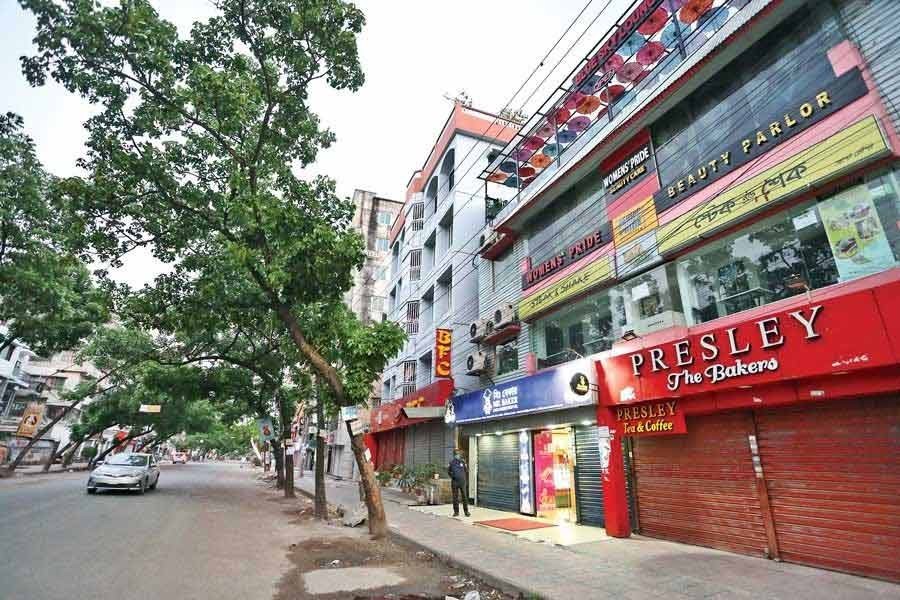The Covid-19 pandemic has wielded a devastating impact on the country's socio-economy during the past quarter, weakening and exacerbating numerous fault-lines and vulnerabilities that existed in various sectors. That becomes evident from a review of findings released during recent days.
Take for example the survey conducted by Bangladesh Institute of Development Studies (BIDS) during May. It found a whopping 16.4 million people sliding below poverty line due to corona-induced difficulties.
Around 50 per cent of them reported a decline in income, while over 20 per cent among below Tk 15,000 per month category claimed they had no earnings. Among the people earning less than Tk 11,000 per month, 57 per cent had no income, 32 per cent saw a decline in earnings, and only about 11 per cent reported income at the previous level. This has happened in the wake of a 10 per cent rise in commodity price.
Another BIDS survey on small and medium enterprises (SMEs) shows 63 per cent workers do not anticipate any wages for May. Among the owners and managers, 66 per cent expected their sales volume to be much less than the previous year, as 76 per cent factories had unsold stocks and 73 per cent were yet to receive payments against sold commodities. The situation was worst in leather and leather goods industry, fabrics for domestic market, home textiles and rural SMEs.
The workers reportedly revealed that their daily meals have come down to 2.75 from 3 meals per day due to loss of income. It may be recalled that 96 per cent of the country's industrial units belong to the SME sector, which in turn accounts for 25 per cent of GDP and generates employment for 86 per cent workers.
The BIDS claimed that Tk 300 billion would be needed to make up for corona-induced losses as well as payment of partial wages for workers up to November this year. But only a negligible portion of the Tk 200 billion incentive package already sanctioned by the government has been disbursed in this sector till now.
Meanwhile, a section of expatriate Bangladeshi workers returning from the Middle East have narrated harrowing tales of deprivations and harassment, in a survey conducted by the Refugee and Migratory Movement Research Unit of Dhaka University. The workers who returned from Saudi Arabia, the United Arab Emirates, Qatar and Malaysia alleged non-payment of salaries and forcible return home due to the pandemic despite possessing necessary papers for stay. According to available figures, around 12.30 million expatriate Bangladeshis work in numerous countries around the globe. More than 100,000 of them have returned home since the outbreak of coronavirus.
Another alarming trend has been the push-migration of many unemployed citizens from Dhaka city to their ancestral homes. According to a survey conducted by BRAC in May, about 36 per cent city dwellers have lost their jobs and 3.0 per cent did not receive salaries despite having jobs. Among the daily wage labourers, 62 per cent are now without work. Income of city dwellers has declined by 60 per cent, while this trend has also been observed in 10 other district towns.
This outflow is having a multiplier effect on other sectors like housing, as rented houses are becoming vacant at an accelerated pace. This in turn is putting enormous economic pressure on the home owners, as evidenced by 'To-let' signs springing up all over the capital city.
Another automatic victim of Covid-19 has been the hotels and restaurants sector, where as many as 3.0 million workers were employed before the virus struck. But now about 60 per cent workers in this sector have become unemployed. The aristocratic upper-end restaurants have mostly been shut down, and others are somehow carrying on business with only one-third of workers. The country's transport, tourism and hospitality sectors are facing a similar fate as passenger movements have been severely curtailed due to lockdown restrictions as well as fear of mass transportation among citizens. This fear is also having a highly detrimental effect on the country's shopping malls and plazas.
The problems of RMG workers have become acute by now. During the first three weeks of June alone, 11,000 workers were sacked by 46 factories. Before that, 9,000 workers were laid off in 69 garments factories up to June 01, claims the government's industrial police. Although labour law is being violated during these dismissals, the Department of Inspection for Factories and Establishments (DIFE) is yet to take any action. This is happening in spite of the Tk 50 billion incentive package for the RMG factory owners sanctioned by the government. The textiles and jute sectors are also enduring lethal bites of the corona. The government has now decided to send 25,000 workers employed in 25 loss-incurring BJMC mills into retirement through golden handshakes, and revive those later through public-private partnership initiatives. And alongside a shambolic health-sector response, the choke-hold on the education system is unlikely to be relaxed before September.
In a country focus report on Bangladesh, the International Monetary Fund (IMF) has claimed in mid-June that the economic impact of Covid-19 in Bangladesh has been felt in three main areas: a drop in domestic economic activity; a decline in RMG exports; and a fall in remittances. The most serious challenges facing Bangladesh today include limited healthcare infrastructure for tackling Covid-19 that requires considerable support from development partners; and maintaining transparency, accountability, effectiveness and good governance in measures taken to deal with the crisis. The IMF also called for an audit of Covid-19-related expenditures within a year after the pandemic disappears.
Dr. Helal Uddin Ahmed is a retired Additional Secretary and former Editor of Bangladesh Quarterly.


